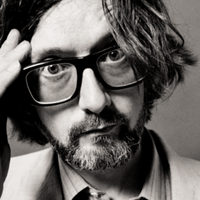On navigating the tension between physical and digital realms
Prelude
Rindon Johnson is an artist and writer. His most recent virtual reality film, Meat Growers: A Love Story, was commissioned by Rhizome and Tentacular. Johnson has read, exhibited, and lectured internationally. He is the author of Nobody Sleeps Better Than White People (Inpatient, 2016), the VR book, Meet in the Corner (Publishing-House.Me, 2017) and Shade the King (Capricious, 2017). He lives in Berlin where he is an Associate Fellow at the Universität der Künste Berlin. He studies VR.
Editor’s note: This interview is part of a series we’re working on with Pioneer Works and Are.na, in advance of this year’s Software for Artists Day.
Conversation
On navigating the tension between physical and digital realms
Artist and writer Rindon Johnson on experiencing a shared virtual subconscious, accepting lots of disparate possibilities at the same time, and how to imagine a better future.
As told to Willa Köerner, 3579 words.
Tags: Art, Writing, Inspiration, Process, Independence.
What are you thinking about today? I’m wondering if there’s anything in particular that is weighing on your mind.
My dad has been really obsessed with the fact that my partner and I chose to stay in Germany right when Donald Trump said, “Either you can come back, or you might have to stay where you are for a long time.” And we chose to stay here for myriad reasons, healthcare mostly.
But my dad was like, “You’re letting the Germans make a really big investment in your health. If you do leave, that means they’ve lost some of their investment.” I’ve been thinking a lot about the fascism implied in that statement, combined with all of the other things that are happening in our reality now—emergency measures that could become very standardized things, the closing of the borders, the way that governments are tracking who’s going where, and monitoring our temperatures. All of these things that I am participating in in one way or another. So I’ve been thinking a lot about what those things are, and what things I’m okay with versus what things I’m not okay with, and then wondering about different strategies that I have to either reject or embrace them.
Yeah, it’s a weird tension to grapple with. Maybe it’s in everyone’s best interest to have governments collecting people’s temperature information right now, but what happens when they don’t need to know that anymore?
Yeah. And what things will they say to keep that power? “Well, we still kind of need to know that just in case X thing or Y thing happens.” It’s like, when is it over? When did it start and when does it end?
As an artist, do you feel the need to address this stuff in your work?
I’m one of those artists who can’t have any hobbies, you know what I mean? Any time I’m like, “Oh, I started doing XYZ,” two weeks later it’s in my work. So I think it’s already happening. I spend a lot of time when I’m with my kid watching live cams. It’s something that I’ve always done, live feeds and live cameras have always been part of my work in one way or another. But now I’m interested in live cams that I never gave a shit about, like live cams of St. Mark’s Square in Venice or the different resorts in the Canary Islands, all these places that I just thought were too picturesque, and also too weird because it felt like watching people during their leisure time.
Now, I’m obsessed with them. They’ve taken on this eery calm due to all of the intense martial law things that are happening throughout Europe. Just the quiet of it, watching the police make their rounds, watching them not follow the social distancing rules amongst themselves, because they’re kind of in their own realm—that’s really fascinating to me. Most of the live feeds that I watch I also record. It feels photographic to me, and I know I will want to revisit this when it’s different again.
As somebody who works a lot in VR, how has it felt to see everyone creeping closer towards a virtual reality, now that we’re all limited to connecting digitally? Do you think this will push us towards living in a more virtual world, beyond COVID?
I have this fellowship where I’m researching VR very outright. So my thought was, “Okay, I’m just going to spend a lot of time in VR.” When I began to do that, I found almost immediately that my eyes started to get really fucked up. I was struggling with being in VR for more than three or four hours at a time. Stuff was also happening with my ability to relate to physical bodies that was really shocking and confusing to me. I would pick up my kid and her skin would look odd, and all this stuff was happening with my senses that felt really weird.
I would also start to long to be in virtual space in a way that I had never felt before. Because of this, I created a hyper-regimented schedule for when I could be in VR and when I couldn’t. Now that this feeling is something that’s happening to more people, with VR or meet-ups or VR graduations, some of the concerning things that I experienced are starting to pop up more in forums and Reddit and shit. More people are like, “My head hurts. My eyes hurt. But I don’t want to leave.”
I think that what’s interesting about VR, and what the main crux of my research is, relates to this: When you’re in virtual reality with a group of people, this thing happens where you start to anticipate one another in the same way that you anticipate moving to the left when somebody’s walking toward you on the right. It’s like, you don’t talk about it; because you’re in relation to their body, you just move subconsciously. The same thing happens in VR, where when you’re communicating with someone for long enough, you start to anticipate the movements of their avatar, and you start to be able to do that easily.
My friend Jordan’s mom, Lori Kolesnik, who’s a psychiatrist, finally locked these ideas together for me. She was like, “It sounds like what’s happening is that there’s a shared subconscious that’s going on.” That idea of sharing a digital subconscious is something I’ve been thinking about a lot, because my passing thoughts should be just mine, invisible within my own body, right? But then suddenly I’m sharing them with someone else, subconsciously, in virtual space.
And so, there’s this thing that I think we’re going to start to run into, which is if I say I thought about robbing a liquor store, nobody can prosecute me because I didn’t rob the liquor store. It was a passing thought. But if I physically rob a liquor store, you can prosecute me. In VR, it’s much muddier, because it’s like, if someone reaches out their virtual hand and touches someone’s avatar body in a way that’s inappropriate, they’ve done something to that person that feels physical. A passing thought has become a physical movement in virtual space, and has perhaps been enacted on someone in a way that makes them feel physically violated. How do we deal with that? VR might be an opportunity to try and sort out alternate methods of rehabilitation for things that hurt other people. It is an opportunity to rewrite how we deal with one another because it demands a new way of dealing.
We need more shared intentions about how we do things in virtual spaces. Some of them are just being written as we go, like when you’re on a Zoom call with more than four people, you mute your microphone, you know? People have learned to do that, because if they don’t, someone’s like, “Hey man, press mute, we don’t need to hear your kids in the background.” But that kind of thing is the lower end—beyond that there’s all this other crazier stuff that I don’t know how we’re going to move through.
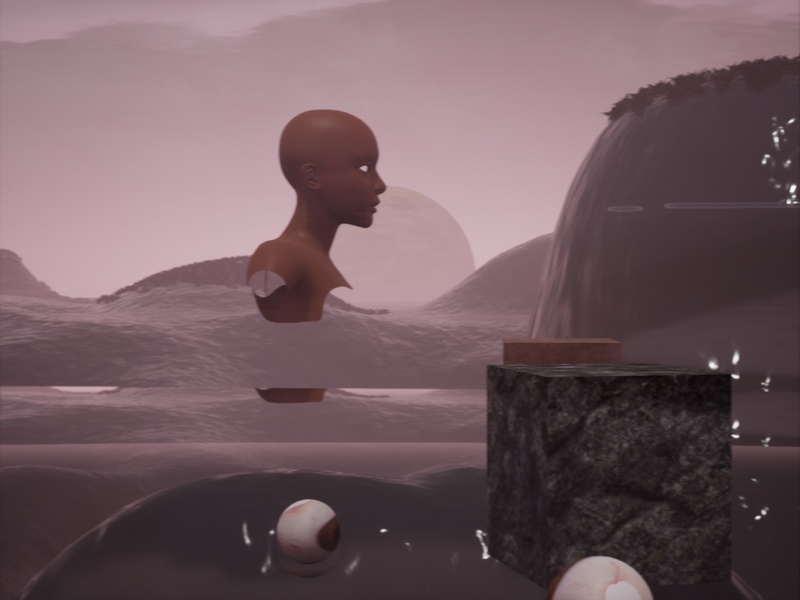
I First You (11/11), 2018; Single Channel Video Work, 5:28; Commissioned by Daata Editions; Soundtrack by Milo McBride; An old romantic recounts memories of another time as the viewer spins through a glass island inhabited by little monuments in a placid, hilly sea.
It’s like, “Do we just create virtual reality rules based on physical reality? Or are there different norms?” It’s a very wild-west world out there.
Yeah, totally. If we make the rules based on the norms of physical reality, we lose some of the awesomeness about VR immediately. And I don’t want to lose that, but at the same time also I don’t want other shit to happen, either.
These days we’re using tools and digital platforms that are created by corporations who would like us to use them 24 hours a day, incessantly. They’re designed to be addictive, and often without concern for ethics or our personal wellbeing. I’m curious how you’ve sorted through that tension on a more personal level, in terms of your own routines?
The deeper that I go in my virtual reality research, the more adamant I am about spending less time on my computer and phone. I think that has to do with the fact that my kid’s getting older, and so it’s not okay for me to not be physically present. But on a personal level, it’s also about how much anxiety I let flow through me by being readily available virtually.
Sometimes I go to VR churches, because that’s another stem of my virtual reality research. When I’m watching people worship in virtual reality, it can be really intense. There are so many emotions, and you can really sense them coming from the group. So after I go to a service in VR, I tend to stay away from VR for a few days.
All of these virtual worlds form a slippery slope. I met with this artist recently, Chris Velez, who will just make things to fall off of in VR. Like, he’ll make these crazy, crazy worlds and then he’ll take his avatar and just fall through the world over and over again. I used to do that all the time, too, and one day my partner was like, “No more falling. You can’t fall anymore. It’s making you crazy.” The sensation that happens in your stomach when you fall in VR is so otherworldly. Once you start doing it, it’s really hard to stop.
That’s one of the weirdest addictions I’ve ever heard of.
Yeah. I mean, the first few times you do it, it really feels like you’re falling, and then you realize it’s something totally different.
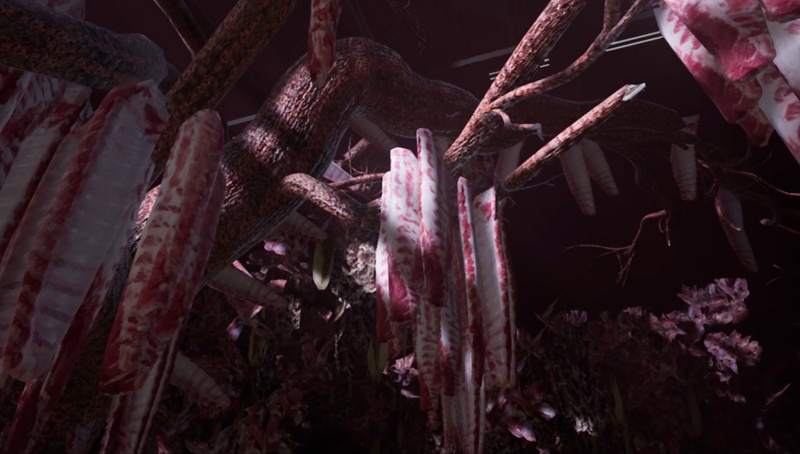
Meat Growers: A Love Story; 2019; Virtual Reality Work, 13:42; Made Possible by Rhizome and Tentacular; Animation: Pariah Interactive; Meat Growers centers on a speculative-fabulation based fictional tale of love and longing between two coworkers in a meat growing plant. As the hunger saving Meat Trees make their sentience known to the world, the lovers find themselves caught in a quarrel: do they continue to exploit the Meat Trees or do they find a new source of food for their community?
Do you feel optimistic about the possibilities opened up by digital technology and virtual worlds? Are the possibilities they present mostly beautiful in your mind, or do you feel more concerned by them?
The thing that I find most beautiful about technology generally is the possibility that we could use it to come up with a different way of seeing people, and a way to be more compassionate to one another, and we can use it to simulate what that might look like. This is part of a much bigger question where I sat down one day and I was like, “You know, I actually have never really asked myself what world I want to live in. I’ve just been like, ‘Well, obviously I would like it if there were no prisons.’”
But it’s like, okay, how would I execute that? I feel like what virtual space and technology elects for is the running of these two relations, and getting things to a point where a lot of really amazing things could be possible. So I think that that’s what I find most beautiful about technology. It makes building new possibilities really easy.
People often say, “You’re only limited by your imagination,” but we are limited by our imagination in many ways. Do you have any tips for people who struggle to imagine a better reality? What is the recipe for imagining something different than what we already have?
I do this thing sometimes when I’m trying to think of an idea, where I shut myself down a lot and I say, “No, that can’t happen.” But I know that I’m really in the zone when I stop shutting myself down, and I start just being like, “Okay, yeah. The meat grows on the trees. Great. Let’s move on.” Accepting the insanity of your own possibilities is so important.
I read a David Lynch book about meditation when I was like 16, and I didn’t realize how influential it was until I got older and started to realize that I was doing the technique he talks about automatically. It was called Catching the Big Fish or something, but the idea is, you close your eyes and let all the ideas go through your head. You don’t log any of them, you just let them slide past you and slide through you until one gets so big in your brain that you can’t let it go. Then you have to go grab it and find it. And I feel like that sensation is kind of when I know that I’m imagining the most insane thing possible, because I just can’t let it go. I have to go find it and catch it, make it bigger and share it and talk about it.
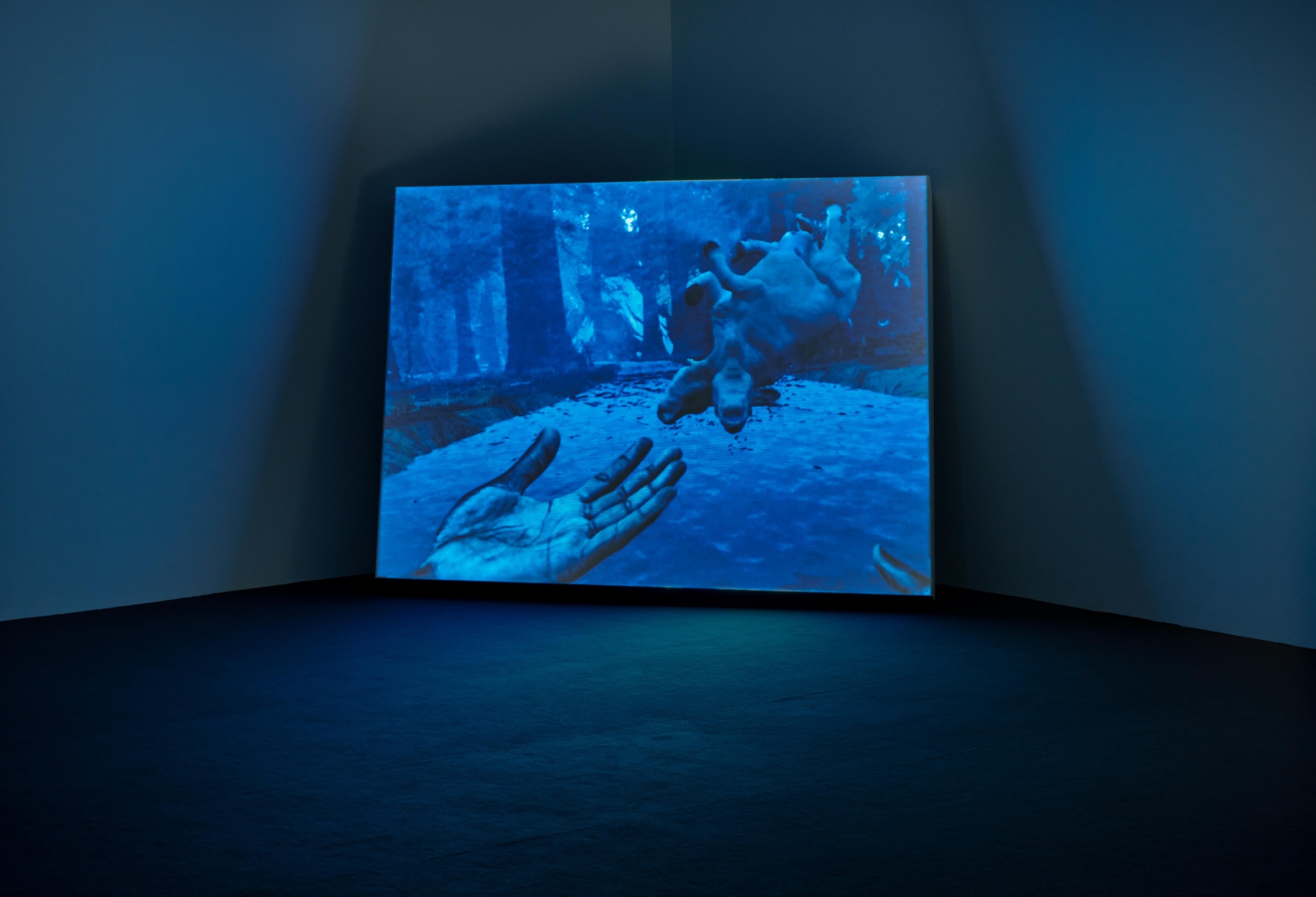
Diana Said: / If you stop me / from cutting / your hair, / there is a sense / in which / you are / interfering. / * / But, since you are entitled / to determine / whether I cut your hair / or not, you do not / wrong me. / * / I make your trip to the store a waste. / * / I buy the last quart of milk / before you / get there. 2019; Virtual Reality Work, 7:15; Animation: Pariah Interactive; Photo: Alwin Lay
As an artist working in technology, do you have any requests for software designers or people making technology right now? Something you’d ask them to be more mindful of, or to consider doing?
I guess I would ask them to start asking where their shit’s coming from, you know what I mean? Like, where’s all their data really being stored? Where is their cloud? What energy are they using? Who’s benefiting off of their labor? Really straightforward things like that.
Also, I sometimes feel that there’s just not a lot of literacy between the worlds of technology and art, but this doesn’t mean that there’s not a lot of crossover. I see how the art world can be incredibly intimidating, and if you’re someone who is working in a technological realm, maybe you might feel shut out. To someone feeling that way, I’d like to say that there’s actually a lot of overlapping conversation about what we do next and how we move forward. I guess what I’m trying to say is I want more collaboration between those two spaces.
I see it as there’s sort of a Silicon Valley mentality of seamlessness and efficiency that often feels counterintuitive to the art world, which is more about slowly thinking and exploring. And I think that slowing down and exploring more might actually help technologists get to some of the stuff that they’re trying for anyway.
Your work is pretty technologically advanced. I would have no idea how the heck you make it. How did you learn how to create your work?
One day back in 2015 or something, I just had this moment where I was like, “I think I need to understand how 3D technologies work.” After that I taught myself how to use Blender, and then Unreal, and from that point forward I was like, “Okay, I get how these things work.” For my earliest work in Unreal, I made it all by myself. I think it was a flat-footed piece, a bad piece, but people seemed to like it.
From there, I think it was just a lot of time spent watching 14-year-olds in the middle of the country show me how to do stuff on YouTube. That’s basically how I learned how to make my work. I’m really grateful to all of them. They’re really cool and they answer your fucking questions if you have them, and they’re really patient and sweet and kind.
That’s a really nice thing to realize. As somebody who creates a lot of digital things, I know it can be really hard to tell if you’re actually helping anyone, since most readers or viewers just show up as a “like” or a number in Google Analytics. Do you have any thoughts on how to really feel your work’s impact when it’s put out in digital space?
Honestly, I often don’t feel my work’s impact, and I think sometimes with my early digital stuff, I was discouraged by that. I know it makes me sound like such a YouTube nerd, but it’s like, “Smash that like button.” If you like something online that someone made, say you like it. It’s a good thing to do. When I watch a tutorial more than once, like when I forget how to do something and I have to go back to the exact same tutorial again, that’s usually when I’m like, “Hey, dude. Thanks, this was really helpful.”
Yeah, it’s like we’ve all automated our feedback so much that nobody gets any real feedback.
Yeah, it’s really true. And I mean, I’m guilty of it. I guess we need to be more intentional about it.
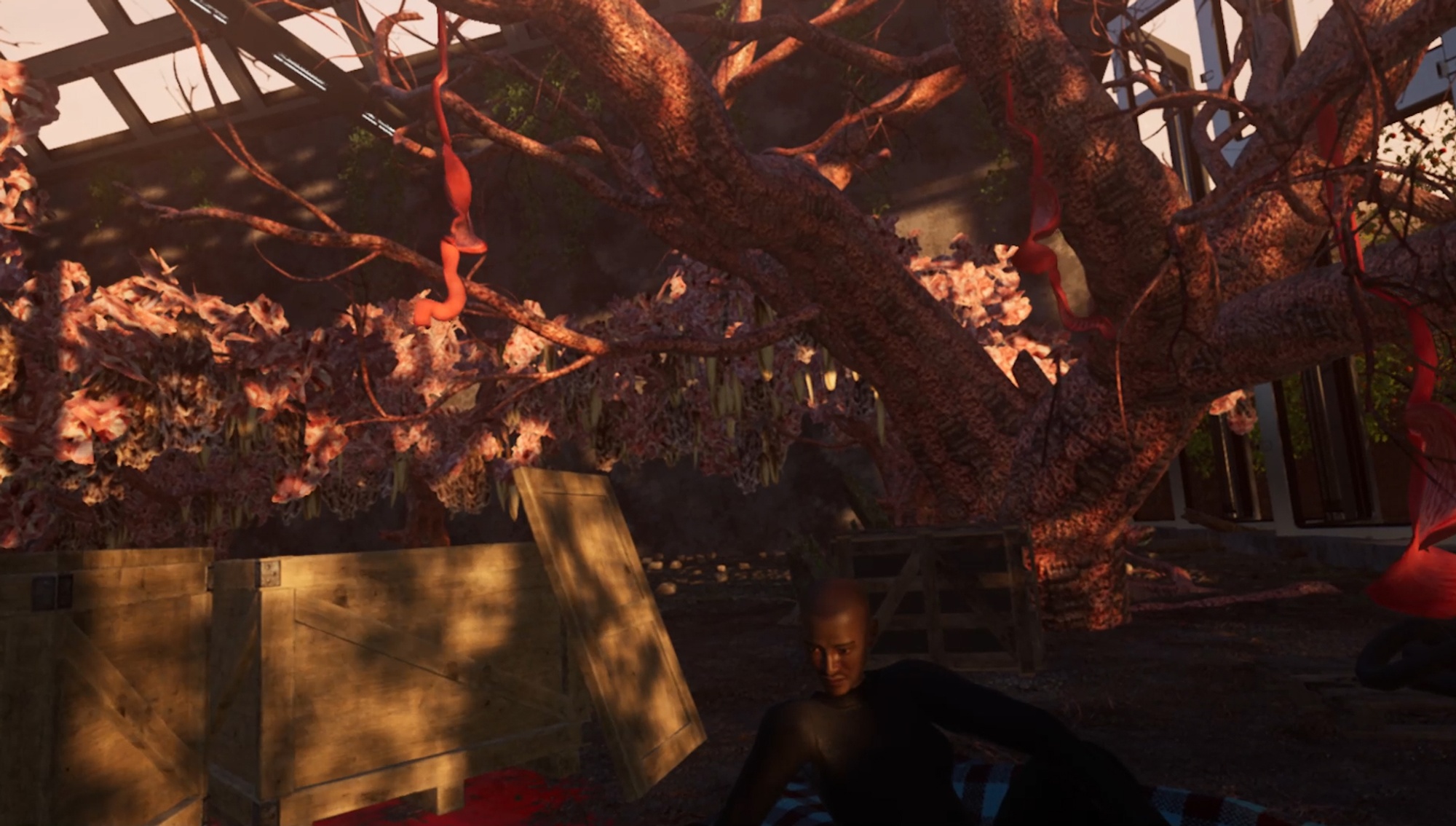
Meat Growers: A Love Story; 2019; Virtual Reality Work, 13:42; Made Possible by Rhizome and Tentacular; Animation: Pariah Interactive.
Do you have any other examples of how being intentional with technology can pay off with something really meaningful happening?
One thing that comes to mind is from when I was getting really obsessed with this bear cam from the Katmai National Park up in Alaska. They have these cameras all along the park, where they’re just watching the bears get salmon 24 hours a day. Once there was this really incredible moment where the camera was focused on this bear who was under a waterfall, desperately trying to grab this fish, but was just failing. It just wasn’t working out. There was a moment where I could just see the bear kind of sighing, as if they were realizing that they had become something different than they thought that they were, and it was outrageous. It just felt insane that I was sitting in upstate New York watching this bear in Alaska having this private moment inside of their own body.
I was just like, “I can’t believe this is happening.” Moments like that I guess happen to me quite often, when I’m using a technology that I’m not fully in charge of, and these really serendipitous moments will happen while I’m interacting. It just suddenly all aligns.
If you could imagine back to where you were 10 years ago, what would you like to tell your past self? Knowing what you know now, is there anything you shouldn’t have worried about so much?
Well, 10 years ago I was like, 20 years old, smoking weed and taking photos and chilling at NYU. So I think I actually had very few worries at that point in time. But then my nine-years-ago self became very, very worried about identity politics and representation in a way that became detrimental to my understanding of how to treat other people.
As I’ve been getting older, I’ve had this realization that while actually demanding specific racial politics is necessary in certain situations, it’s also important to know when to let some things go. So I’d want to tell my past self, “It’s okay. Everything doesn’t have to be perfect.” I think my biggest preoccupation at the time could be summed up with the question: “How could I be a good Black artist and still really like Joseph Beuys?” I had this block about it, and it’s actually fine. Everything’s possible and that’s good, and being open and capable of accepting lots of disparate things at the same time is key. So yeah, maybe that’s what I would say mostly. “Chill out, man.”
Rindon Johnson recommends: 5 webcams that keep good (enough) company
-
Puerta del Sol - Tio Pepe - There’s hundreds of reasons I love webcams but I never thought that martial law in the name of public health and the subsequent organizational pageantry from the bird’s eye view would look so perplexingly intense and compositionally pleasing.
-
Trevi Fountain - Squeezed into a corner, there’s a family of ducks that seem to be frequenting the fountain since the Italian government has issued the stay at home order. The police and authorities move past the fountain matter of factly.
-
Old Faithful - The geyser still erupts even when the park is closed
-
Port of Miami - It used to be that you could watch the cruise ships come and go but now the cruise ships wait, mostly from what I understand with their crews and passengers on board waiting to see if they can leave thanks to COVID
-
Santa Monica Beach Cam - You can hear the waves even.
- Name
- Rindon Johnson
- Vocation
- Artist, writer
Some Things
Pagination

